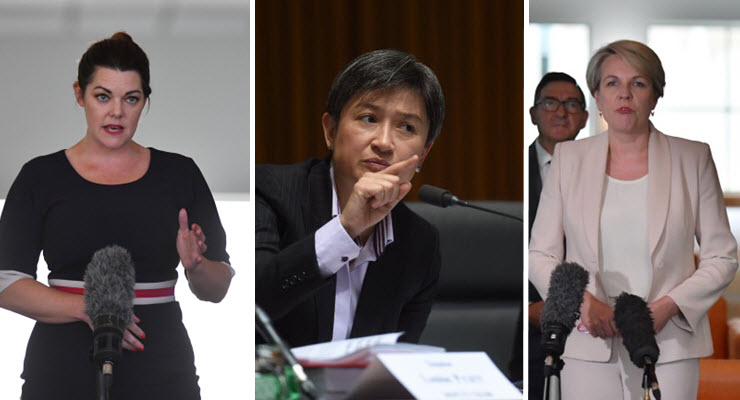
Imagine how good the political competition would look if the opposition was led by women. Imagine if, instead of another man standing opposite another man in Parliament and apologising for the constant cases of sexual harassment, sexual violence, bullying and misogyny across party lines, it was a woman standing there explaining exactly how her party would address it.
Women in Parliament have been spoken over and ignored, bullied and harassed. They’ve had their desks masturbated on, their underwear photographed, and their staffers raped, groped and forced into relationships they felt they couldn’t leave.
Would a female leader fix this? Absolutely not. Is it up to women to fix the behaviour of men? Absolutely not. But has a female politician ever masturbated on a colleague’s desk? Has a female staffer ever been accused of raping a colleague? Has a female politician ever paid sex workers to give them a blowjob in parliament? As far as we know, no.
Both Labor and the Greens have plenty of senior women in their ranks. Labor has 45.5% female representation and the Greens have a female majority at 58.3%. This makes it even more startling that the parties, with a few historical exceptions, are constantly led by men. Labor’s Tanya Plibersek, Katy Gallagher, Penny Wong and Kristina Keneally, or the Greens’ Larissa Waters, Lidia Thorpe, Mehreen Faruqi and Sarah Hanson-Young are all examples of potential leaders.
A female leader won’t fix everything. Feminism is not a magic key. In fact, as I pointed out in last week’s #MeTooWhere series, many women have reached their positions on the basis that they are unlikely to challenge the status quo or Parliament’s culture. Many women, including Liberal MP Karen Andrews, have been accused of bullying and intimidation. There is a risk a female leader could be more of the same under a different name.
A further question is, would any woman want to lead a political party following Julia Gillard and Julie Bishop’s treatment? The gaffe at Gillard’s thighs and breasts being served up at dinner, along with former prime minister Tony Abbott’s “ditch the witch” campaign, happened less than eight years ago. Bishop, Julia Banks and Nicolle Flint’s resignations are still raw.
But having a female leader would send the message that we trust women to hold the highest office in Australia, and that we trust women to lead by example. And that Australia, finally, is ready for change.








Crikey is committed to hosting lively discussions. Help us keep the conversation useful, interesting and welcoming. We aim to publish comments quickly in the interest of promoting robust conversation, but we’re a small team and we deploy filters to protect against legal risk. Occasionally your comment may be held up while we review, but we’re working as fast as we can to keep the conversation rolling.
The Crikey comment section is members-only content. Please subscribe to leave a comment.
The Crikey comment section is members-only content. Please login to leave a comment.